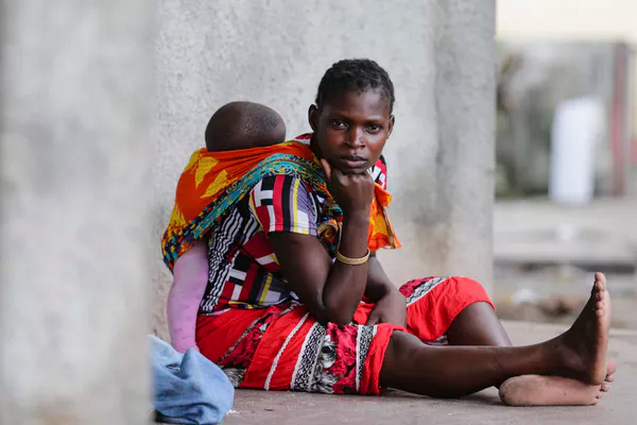 |
Cyclone Idai wreaks havoc in Mozambique.
EPA-EFE/JOSH ESTEY
|
These criticisms share a common accusation – that the striking children, while well-intentioned, are behaving counter-productively. Instead of having a rational response towards climate change, they let emotions like fear and anger cloud their judgement. In short, emotional responses to climate change are irrational and need to be tamed with reason.
 |
Immanuel Kant (1724-1804) – his moral philosophy had a lasting influence on how we view emotions and rationality.
Johann Gottlieb Becker/Wikipedia
|
Today, much of political debate is moderated with the understanding that emotions must be tamed for the sake of rational discourse. While this view stands in a long tradition of Western philosophy, it invites Jordan Peterson and Ben Shapiro to insist that “facts, reason and logic” can dismiss an emotional response to anything in debates.
However, the view that emotions aren’t part of rationality is false. There’s no clear way of separating emotions from rationality, and emotions can be rationally assessed just like beliefs and motivations.
Emotions can be rational
Imagine you’re walking in the woods, and a huge bear approaches you. Would it be rational for you to feel fear?
Emotions can be rational in the sense of being an appropriate response to a situation. It can be the correct kind of response to your environment to feel an emotion, an emotion might just fit a situation. Fear from a bear coming towards you is a rational response in this sense: you recognise the bear and the potential danger it represents to you, and you react with an appropriate emotional response. It could be said to be irrational not to feel fear as the bear walks towards you, as this wouldn’t be a correct emotional response to a dangerous situation.
Imagine you find out that a meteor will kill millions of people across the world, displace hundreds of millions more, and make life for the remainder of humanity much worse. The world’s governments neither put a defence system in place, nor do they evacuate the people threatened. Fear from the meteor, and anger at the inaction of governments, would be a rational response as they are an appropriate reaction to danger. And if you don’t feel fear and anger, you’re not appropriately responding to a dangerous situation.
As you’ve probably guessed, the meteor is climate change. The world’s governments aren’t addressing the causes of climate change or preparing to mitigate its impact. For the people of Mozambique, who are reeling from the devastation of Cyclone Idai, anger is entirely appropriate. Climate change is largely a product of economic development in richer countries, while the world’s poorest are bearing the brunt of its effects.
 |
| A woman and child take shelter in Beira City, Mozambique, after the passage of Cyclone Idai. EPA-EFE/TIAGO PETINGA |
Regardless of how fitting an emotional response is, it may sometimes be unhelpful for what a person wants to achieve. Theresa May makes this point about the school strike: understandable, but young people missing valuable lessons makes it harder for them to solve climate change. As others have already pointed out, climate change demands rapid action – waiting until some vague point in the future when the children are old enough to do something is relinquishing responsibility instead of meaningful action.
It is, however, hard to deny that fear and anger sometimes lead people to choices they regret. However, dismissing emotional responses on this basis is too quick. There are many examples where fear and anger have triggered the correct response and created a motivational push for change. As Amia Srinivasan, an Oxford philosopher working on the role of anger in politics, puts it,
Anger can be a motivating force for organisation and resistance; the fear of collective wrath, in both democratic and authoritarian societies, can also motivate those in power to change their ways.
 |
| Young people take part in a climate strike in Edinburgh, Scotland. Lauren McGlynn, Author provided (No reuse) |
So, not only are children, who are angry and scared about climate change, rational, they might be more so than the adults criticising them. Emotions play a bigger part in life beyond rationality – they mark values and indicate what people care about. Fear of the future and anger at inaction are ways young people can express their values. Their emotions are, in the words of feminist writer Audra Lorde, an invitation to the rest of society to speak.
Dismissing the emotions of school children not only invalidates their rational responses to a grave situation – it implicitly states that their values aren’t taken seriously, and that adults don’t want to reach out to them.
Links
- School climate strikes: why adults no longer have the right to object to their children taking radical action
- Climate Strike: Greta Thunberg Calls For ‘System Change Not Climate Change’ – Here’s What That Could Look Like
- Students Worldwide Skip School To Demand Tough Action On Climate Change
- Climate Change Strikes Across Australia See Student Protesters Defy Calls To Stay In School
- Teenage Climate Activist Nominated For Nobel Peace Prize
- Students Are Striking For Action On Climate Change — A Truancy Everyone Should Applaud
- Striking Schoolkids Should Wear Storm Of Criticism As A Badge Of Honour
- Amsterdam's First National Climate Change March Draws 40,000 People
- Climate Change And The Power Of One
- Striking For The Future: From Australia To Japan To India, Youths Will Skip School On March 15 To Protest Against Climate Change
- Extinction Rebellion: I’m an academic embracing direct action to stop climate change
- Rosa Luxemburg: revolutionary warned of environmental destruction and resurgent far right
- How a moral philosopher justifies his carbon footprint

No comments:
Post a Comment